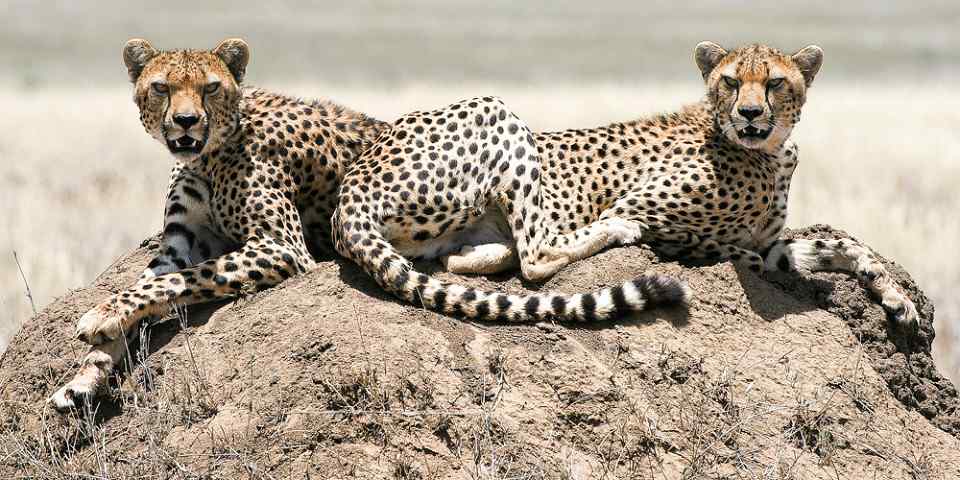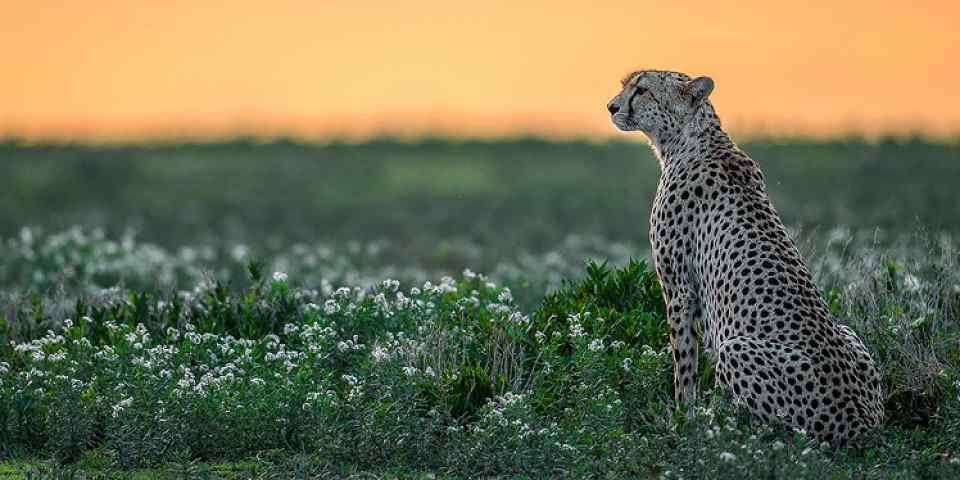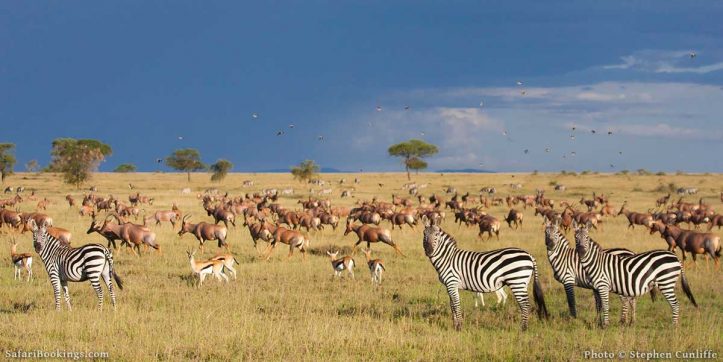
Top 10 Best Tourist Attractions in Tanzania
 By
Stephen Cunliffe
By
Stephen Cunliffe
Stephen is a travel writer and avid conservationist whose work appears in prestigious magazines such as Africa Geographic and Travel Africa.
From the snowy peak of Mount Kilimanjaro to the palm-fringed Indian Ocean coast, Tanzania is a land of unrivaled variety. Big-name attractions include the thunderous wildebeest migration through Serengeti National Park, the Eden-like Ngorongoro Crater and the sultry Spice Island of Zanzibar. More low-key but equally stellar things to do include boat trips on the hippo-crammed Rufiji River in Nyerere National Park, tracking chimps in the western forests and diving the reefs off Mafia Island. It is difficult to pick just 10 must-see attractions in this diverse and captivating country, but below we focus on Tanzania’s very best travel highlights.
1. Serengeti National Park – Rated As Africa’s Best Safari Park
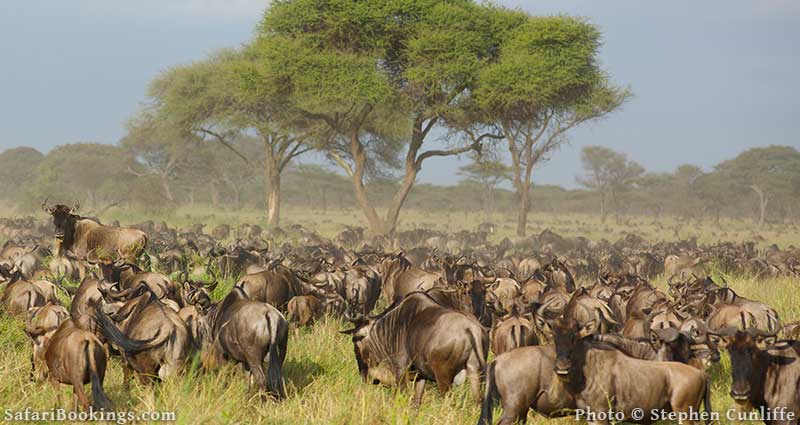
First and foremost is Serengeti National Park, one of the most popular protected areas in all of Africa. Encompassing 14,763km2/5,700mi2 and making up 50% of the wider Serengeti-Mara ecosystem, this is an iconic wildlife area. Sensational scenery dominated by expansive savannah grasslands and peppered with distinctive flattop acacias and Balanites trees make this one of the most picturesque landscapes in Africa. Throw in more than 1.5 million wildebeest, 200,000 zebra and 300,000 gazelles during the great migration and you have a wildlife spectacle second to none. The Serengeti and its surrounding protected area offer a wide variety of safari accommodations and experiences to suit most budgets.
2. Ngorongoro Crater – Dramatic Scenery and Tons of Wildlife
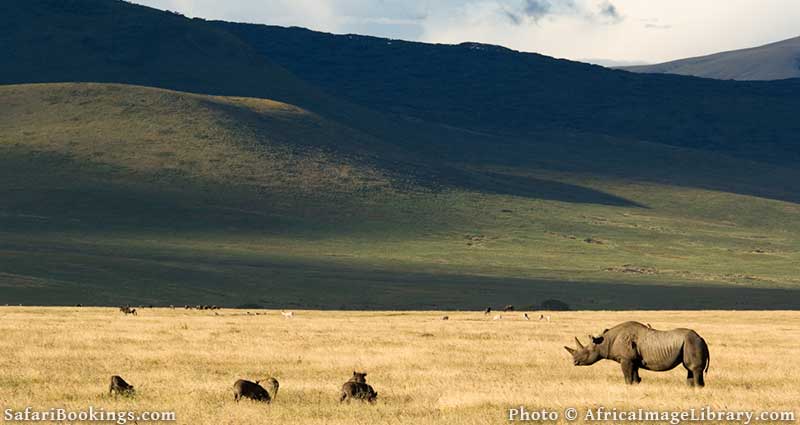
Adjoining the southeast of Serengeti National Park is the extensive Ngorongoro Conservation Area. The unique Ngorongoro Crater is surrounded by towering volcanic walls on every side and blessed with prolific and extremely well-habituated wildlife. Most visitors just see the crater, but the more adventurous leave the safari hordes behind to explore the wider conservation area, which is a mixed-use zone for wildlife and Maasai pastoralists. Within this protected area, the vast Olduvai (Oldupai) Gorge is a palaeontological site made famous by the Leakey family for being home to some of the continent’s most important hominid fossils.
3. Climbing Kilimanjaro – Africa’s Highest Peak
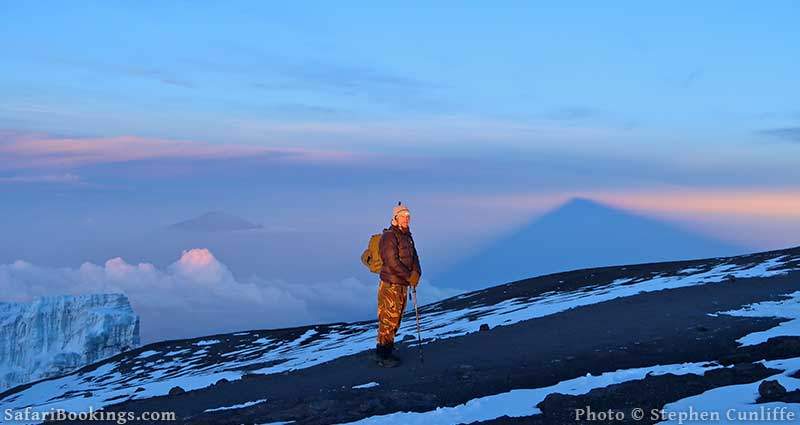
The origin of Kilimanjaro’s name is a mystery. ‘Kilima’ means mountain in Swahili, but ‘njaro’ might derive from either the Maasai ‘ngare’ (water), an old Swahili word meaning ‘white’, or the local Chagga name for the slave caravans that once passed through the area. What is not open to dispute is that Kilimanjaro is Africa’s highest peak (5,895m/19,340ft) and the tallest freestanding mountain on earth.
It is undoubtedly one of the continent’s most magnificent sights, rising up in splendid isolation from the plains below. Located virtually on the equator, this dormant volcano seems so out of place with its snowcapped peak dwarfing the surrounding lowlands. It would be wrong to come to Tanzania and not spend some time appreciating this grand mountain that forms the roof of Africa. You can climb its legendary slopes in the hope of standing atop Uhuru Peak, the highest point on the African continent, or simply gaze and photograph its majesty, as it presides over the plains and parks below.
4. Nyerere (Selous) National Park – Africa’s Largest Wildlife Reserve
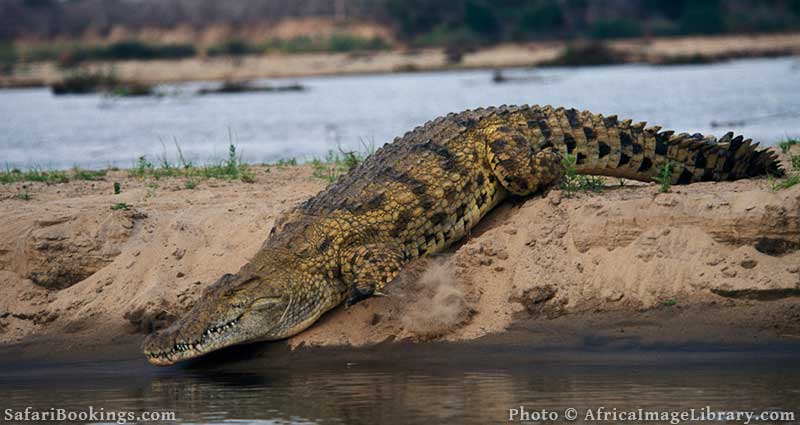
Bisected by the crocodile-infested Rufiji River and home to world-renowned Stiegler’s Gorge, the 30,893km2/11,928mi2 Nyerere National Park (formerly Selous Game Reserve) is an iconic East African safari destination. Despite ongoing poaching in some more remote parts of the park, it remains a long-standing tourist attraction in southern Tanzania. Although illegal hunting ravaged the enormous elephant herds of years gone by, Nyerere still supports around 16,000 of these grey giants, as well as a thriving population of wild dogs.
Tanzania’s government has forged ahead with the development of a huge hydroelectric dam inside Stiegler’s Gorge in the heart of this Unesco World Heritage Site. It remains to be seen whether this will have a significant impact on the park’s ecology and wildlife.
5. Ruaha National Park – Tanzania’s Famous Wilderness Area
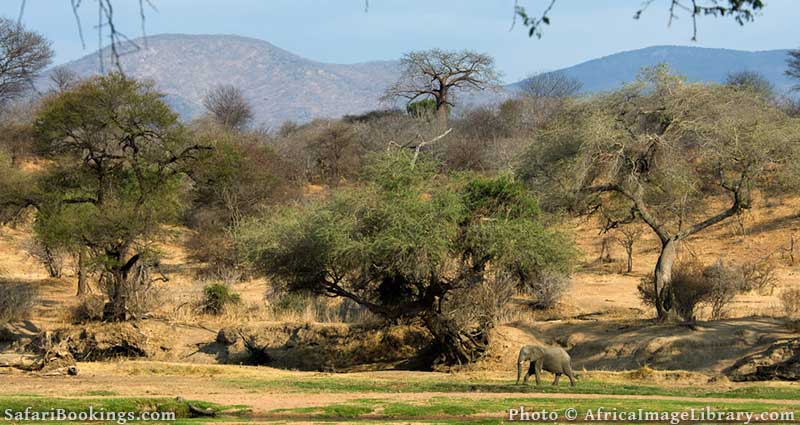
One of the largest national parks in East Africa, the 20,220km2/7,807mi2 Ruaha National Park is almost unknown outside of Tanzania. Yet, with an estimated 10% of the surviving wild lion population in Africa, it definitely deserves to be a highlight on any trip to explore the wild south of the country. Beautiful landscapes peppered with giant baobabs, elephants and abundant plains wildlife are further good reasons to make sure Ruaha is on the itinerary of every intrepid safari enthusiast. It’s also one of the only places in Tanzania where you are likely to see the majestic greater kudu.
6. Katavi National Park – Relatively Untouched Wildlife Paradise
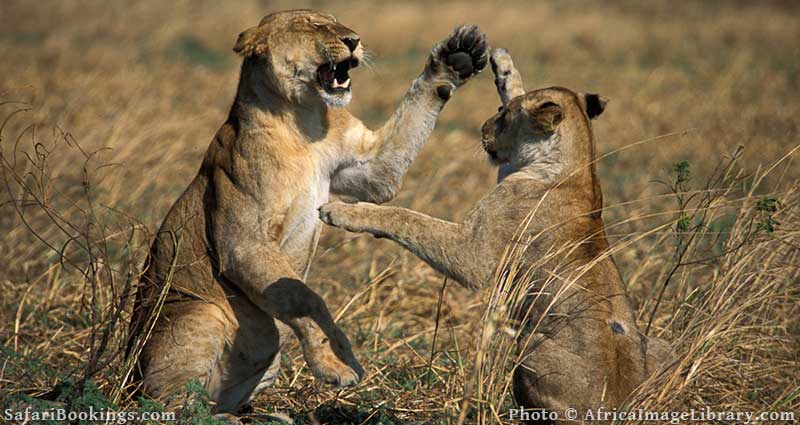
Wild and remote Katavi National Park is one of the country’s most unspoiled and untouched bush settings with amazing landscapes and rich wildlife. The 4,471km2/1,726mi2 park is difficult to access and so can be relatively costly to visit. As a result, few people make the effort to come here. While the popular Serengeti attracts around half a million visitors annually, remote Katavi typically sees fewer than 5,000 brave adventurers in any given year.
This is wild Africa at its very best, and if you have the time and budget it’s a park that’s absolutely worth exploring. There are only a few small, rustic safari camps, so you often come across more prides of lion than tourists on game drives in Katavi, one of Tanzania's largest national parks.
7. Mahale Mountains – Spectacular Scenery and Habituated Chimps
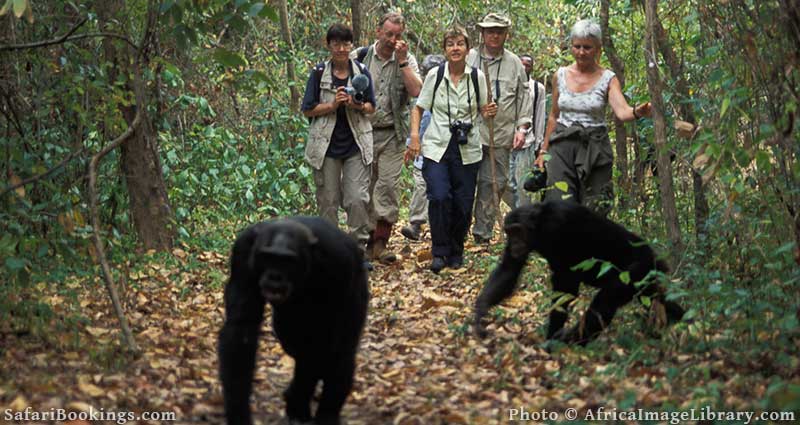
Nestled on Lake Tanganyika with its forested mountains rising up from the shoreline, mesmerizing Mahale Mountains National Park boasts stunning scenery and offers close encounters with habituated chimpanzees. The mist-covered peak of Mt Nkungwe stands sentinel in the background and the crystal clear waters of Lake Tanganyika lap against white-sand beaches. There is no road access, so many safari stalwarts regard 1,613km2/623mi2 Mahale as Tanzania’s most remote park, but also one of its most enthralling.
The holy grail for most visitors is the 75-strong Mimikere or ‘M’ group of chimpanzees, which has been studied by Japanese researchers since the 1960s. While the M group is well habituated, finding our closest relatives can be a challenge. Be prepared for some sweaty, steep climbs through dense vegetation, but the final reward is well worth the trials and tribulations of getting there.
8. Zanzibar – An Indian Ocean Island Rich in Culture and History
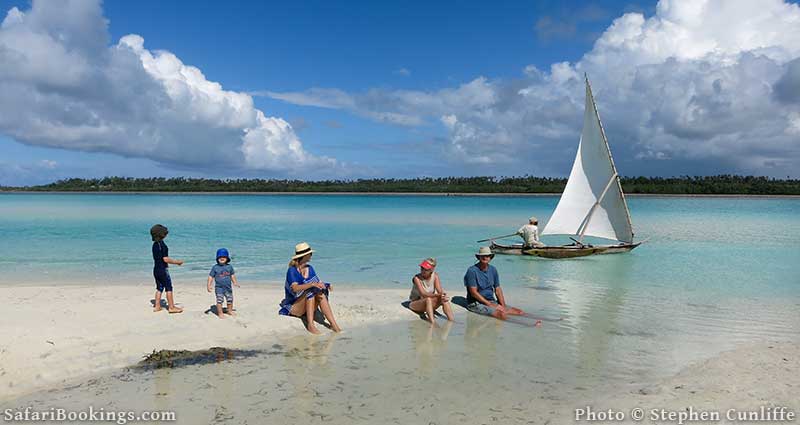
Zanzibar – a beautiful tropical island dotted with aromatic spice plantations and bustling fishing villages – has reinvented itself as a tourism hot spot. It oozes culture and history in Stone Town that is seemingly at odds with its idyllic geography of white-sand beaches and coconut palms swaying lazily in the sea breeze. But it is precisely this diversity that makes Zanzibar such an attractive and varied island to explore above and below the water, as well as a dream destination for simply relaxing and recharging.
For those with deep pockets, nothing beats the exclusive satellite island of Mnemba off the northeastern tip of Zanzibar. With one exclusive &Beyond lodge, Mnemba is the very pinnacle of tropical island beach-chic luxury. For those on a tighter budget, there is a dizzying choice of hundreds of hotels, beach resorts, guesthouses and other accommodations on the main island. It almost goes without saying, but Zanzibar is not a place you should visit if you don’t want to see other tourists.
9. Pemba – The ‘Green Island’ of East Africa
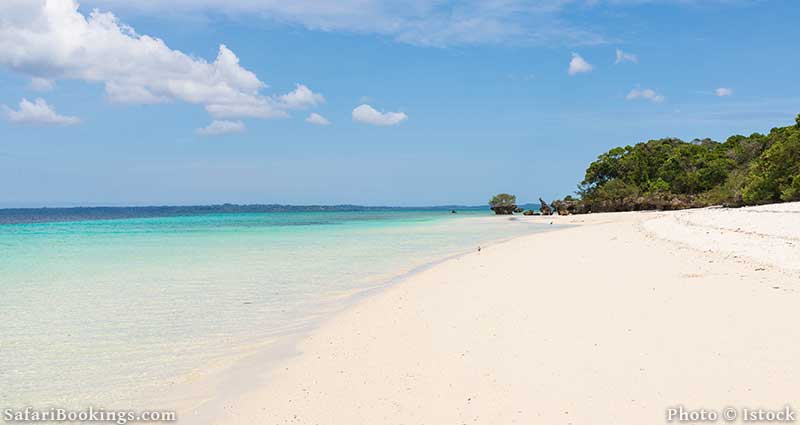
If Zanzibar’s hundreds of hotels and thousands of tourists is not your cup of tea, then a trip to neighboring Pemba is the way to go. Zanzibar’s big brother island has remained a thriving fishing community and is surprisingly free of tourism development.
There are only a handful of tourist hotels to choose from, a number of which are in the far north of the island. The underwater honeymoon suite of the Manta Resort might be the most unique place you could opt to spend a night! But the unpretentious Emerald Bay Resort in the south is the traveler’s pick. Delicious seafood meals served on an open-air rooftop terrace and daily boat cruises to picture-perfect sandbanks in the middle of the ocean make for an unbeatable combo. It’s very easy to lose track of time and spend a week or two relaxing at this affordable island paradise.
10. Mafia Island – A Beach Paradise With Superb Diving
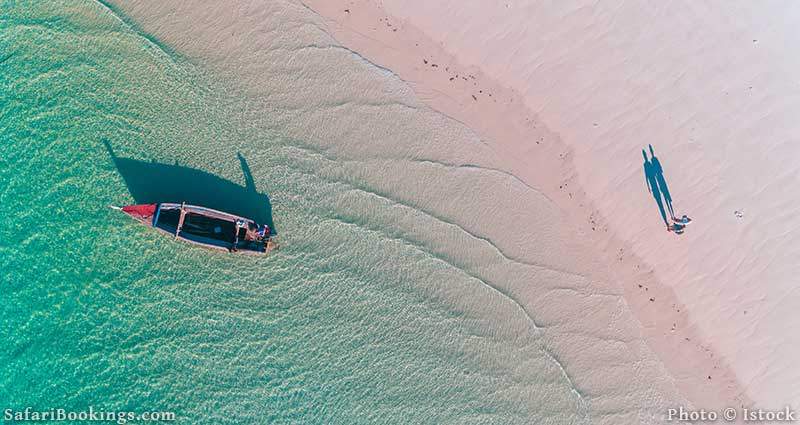
Farther south lies the idyllic coconut-covered island of Mafia. Lodges here tend to be a touch more exclusive than their counterparts on Zanzibar, but without the Mnemba price tag. The beaches are superb and its mangroves and marine park ensure that the marine life is bountiful and the underwater safari experience far superior to Zanzibar or Pemba. More out of the way and a little harder to reach, Mafia is the place for adventurous travelers and diving connoisseurs. The star underwater attraction is the docile and completely harmless whale sharks that frequent the island waters between October and March each year.
Want To Visit Tanzania?
Click on the button below to compare Tanzania safaris offered by top-rated tour operators.
 By
Stephen Cunliffe
By
Stephen Cunliffe
Stephen is a travel writer and avid conservationist whose work appears in prestigious magazines such as Africa Geographic and Travel Africa.
More About This AuthorSafari Tours to Tanzania
-
![6-Day Amazing Wildlife and Cultural Experience Tour]()
6-Day Amazing Wildlife and Cultural Experience Tour
$2,181 to $2,333 pp (USD)
Tanzania: Private tour
Mid-range Tented CampYou Visit: Arusha (Start), Tarangire NP, Serengeti NP, Ngorongoro Crater, Lake Eyasi, Lake Manyara NP, Arusha (End)

Serengeti Smile
5.0/5 – 918 Reviews
-
![8-Day Mid-Range Serengeti Migration Safari]()
8-Day Mid-Range Serengeti Migration Safari
$3,150 to $3,585 pp (USD)
Tanzania: Private tour
Mid-range Lodge & Tented CampYou Visit: Arusha (Start), Lake Manyara NP, Serengeti NP, Ngorongoro Highlands, Ngorongoro Crater, Tarangire NP, Arusha (End)

Lion King Adventures
5.0/5 – 1,350 Reviews
-
![9-Day Budget Safari with Walking & Kilimanjaro]()
9-Day Budget Safari with Walking & Kilimanjaro
$2,420 pp (USD)
Tanzania: Private tourBudgetCamping & Hotel
You Visit: Arusha (Start), Arusha NP, Tarangire NP, Mto wa Mbu (Town), Central Serengeti NP, Serengeti NP, Ngorongoro Highlands, Ngorongoro Crater, Mt Kilimanjaro, Arusha (End)

Serengeti Wakanda Tours and Safaris
5.0/5 – 778 Reviews







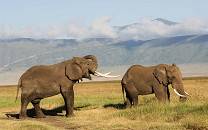


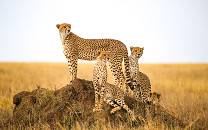

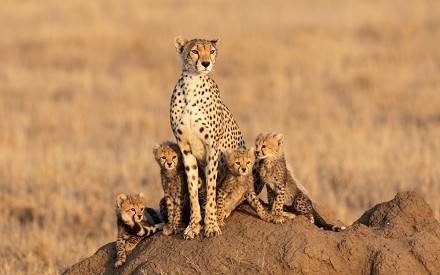
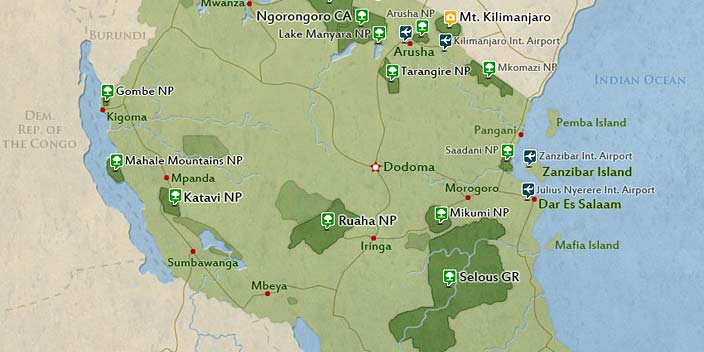
 Subscribe to our newsletter
Subscribe to our newsletter
 Follow us on Instagram
Follow us on Instagram


